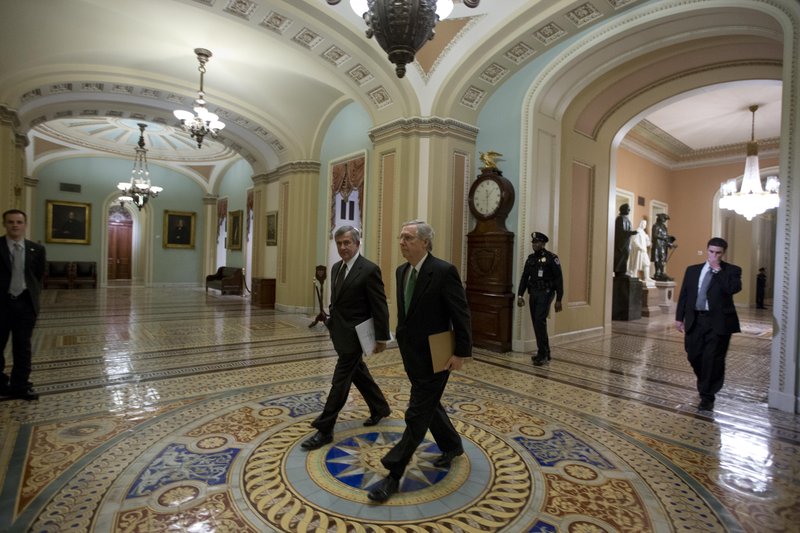WASHINGTON — The Senate-approved compromise to avert the “fiscal cliff” ran headlong into opposition from the No. 2 House Republican and other GOP lawmakers Tuesday, raising questions about how — and in what form — Congress might be able to give final approval to the measure.
“I do not support the bill,” House Majority Leader Eric Cantor, R-Va., told reporters after Republicans held a lengthy closed-door meeting to gauge support for the compromise. Participants in the extraordinary New Year’s Day meeting said there was widespread criticism that the bill did not contain enough spending cuts.
Rep. Steve LaTourette of Ohio said the overwhelming sentiment among House Republicans was to amend the bill to incorporate more spending cuts and send it back to the Senate. Several lawmakers and aides said such a move was likely, and on balance the GOP reaction seemed to seriously complicate efforts to enact a new law before the current Congress expires on Thursday.
“The speaker and leader laid out options to the members and listened to feedback,” said Brendan Buck, spokesman for House Speaker John Boehner, R-Ohio. “The lack of spending cuts in the Senate bill was a universal concern amongst members in today’s meeting. Conversations with members will continue throughout the afternoon on the path forward.”
Boehner has pointedly refrained from endorsing the agreement, though he’s promised a vote on it or on a GOP alternative right away.
Vice President Joe Biden tried rallying House Democrats behind the deal in a separate meeting. When that session ended, Minority Leader Nancy Pelosi, D-Calif., and other top Democrats called on Boehner to allow the House to vote on the Senate-approved accord.
“That is what we expect. That is what the American people deserve,” Pelosi told reporters.
The two closed-door gatherings of House lawmakers came just hours after the Senate used an overnight vote to easily approve the bipartisan compromise, which would negate across-the-board tax increases and sweeping spending cuts to the Pentagon and other government agencies.
In a New Year’s drama that climaxed in the middle of the night, the Senate endorsed the legislation by 89-8 early Tuesday. That vote came shortly after Biden pushed Democratic senators to back the agreement that he and Senate Minority Leader Mitch McConnell, R-Ky., had brokered hours earlier.
The measure would prevent middle-class taxes from going up but would raise rates on higher incomes. It would also block spending cuts for two months, extend unemployment benefits for the long-term jobless, prevent a 27 percent cut in fees for doctors who treat Medicare patients and prevent a spike in milk prices.
The bill ensures that lawmakers will have to revisit difficult budget questions in just a few weeks, as relief from painful spending cuts expires and the government requires an increase in its borrowing cap.
As the House staged a rare New Year’s Day session, it was clear that there were divisions among lawmakers from both parties.
Allowed to lapse was a 2 percentage point cut in the Social Security payroll tax first enacted in late 2010 to help prod consumer spending and goose the economy. It meant an extra $1,000 in the wallets of typical families earning $50,000 annually.
President Barack Obama praised the agreement after the Senate’s vote.
“While neither Democrats nor Republicans got everything they wanted, this agreement is the right thing to do for our country and the House should pass it without delay,” Obama said in a statement. “This agreement will also grow the economy and shrink our deficits in a balanced way — by investing in our middle class, and by asking the wealthy to pay a little more.”
Lawmakers hope to resolve any uncertainty over the fiscal cliff before financial markets reopen Wednesday. It could take lots of Democratic votes to pass the measure and overcome opposition from tea party lawmakers.
Read tomorrow's Arkansas Democrat-Gazette for full details.
